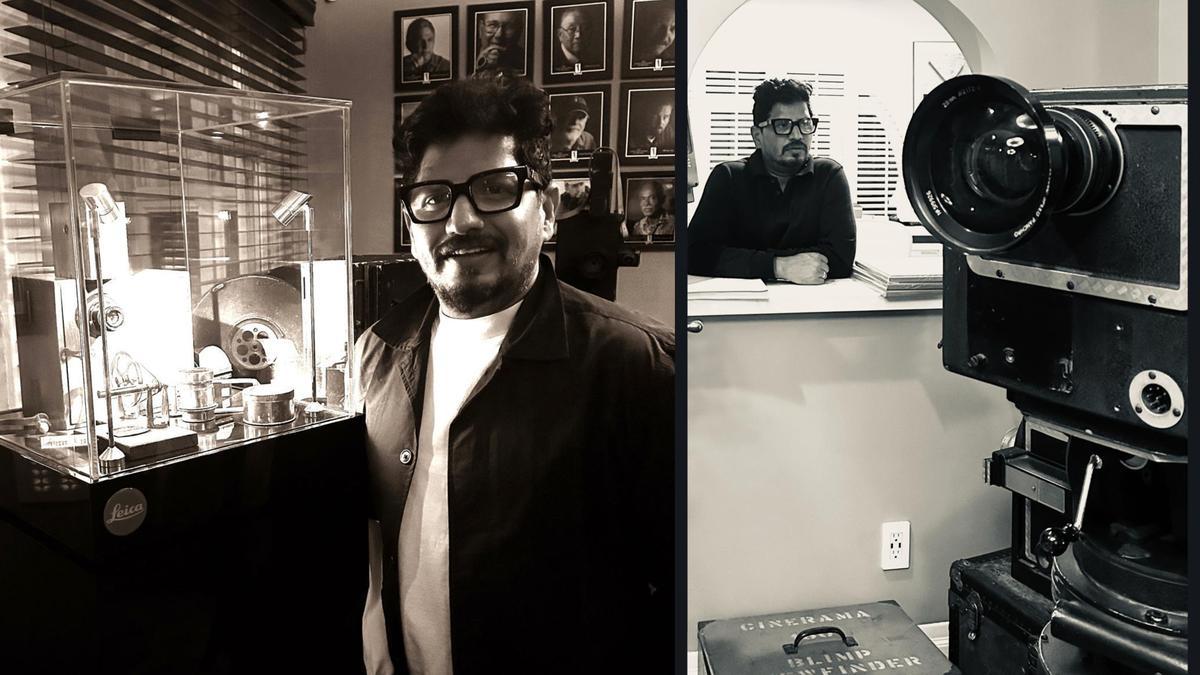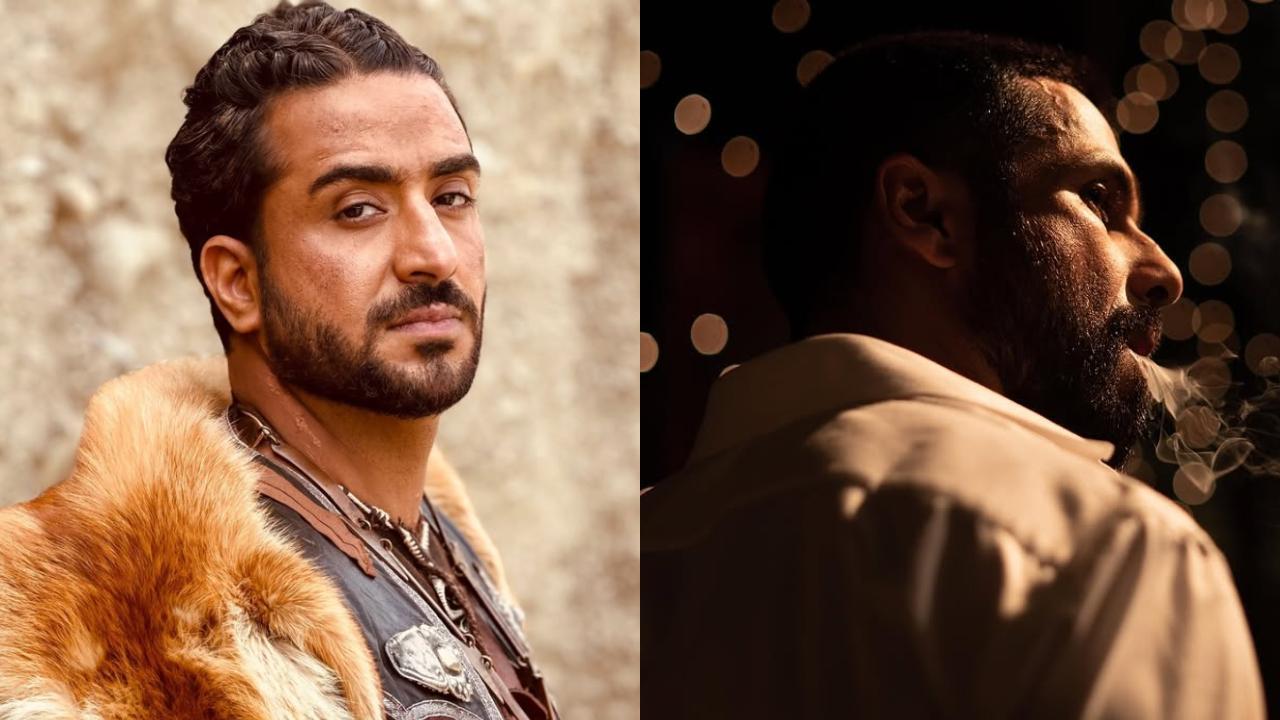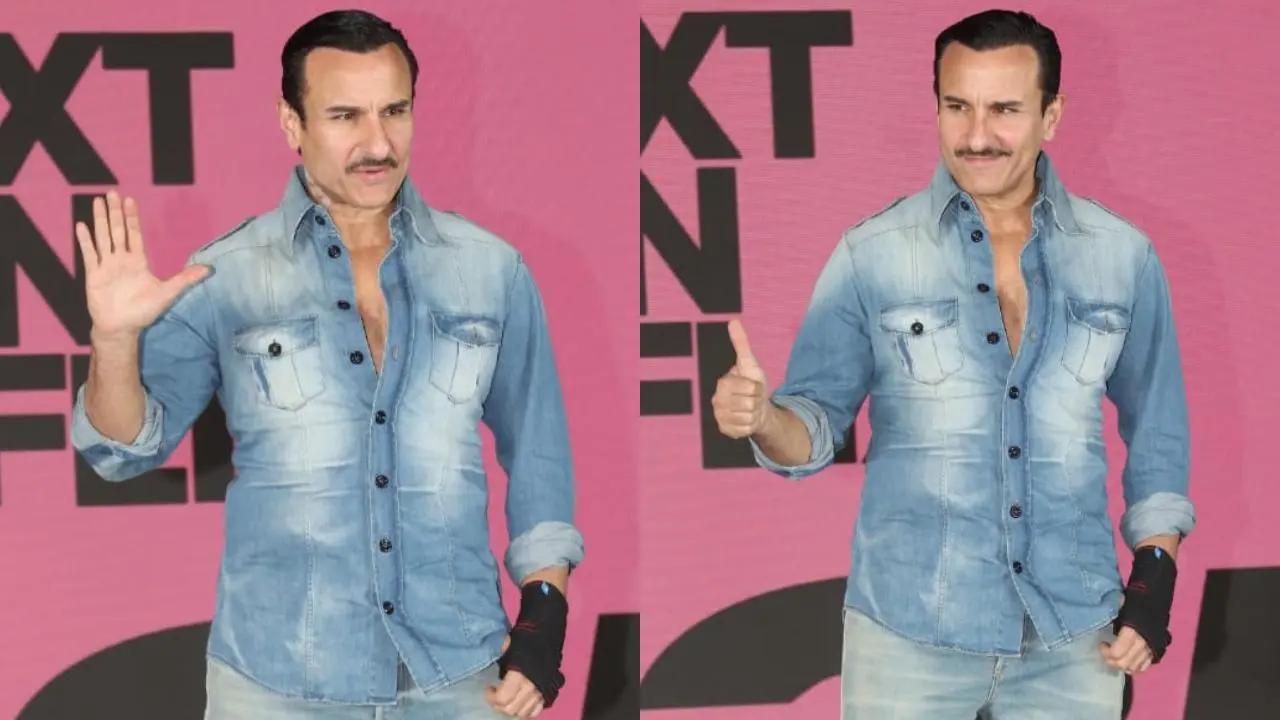
Inside the iconic AVM Studios in Chennai stands an erected stage buzzing with activity. A scene for Love Insurance Kompany is being filmed, and art designers have put together a one-of-a-kind futuristic domicile. Director Vignesh Shivan is occupied, guiding the leading lady, Krithi Shetty, through every step of the scene. As the entire set is busy assembling the many things that go into making a shot, you can see ace cinematographer-filmmaker Ravi Varman orchestrating his team of cameramen with a zen-like focus. While the hundreds around him leave a thousand footprints every hour, Ravi exudes the stillness of a veteran martial arts guru; seated inside the structure, he gets the job done with minimal fuss. You almost miss his presence on the set, and it seems like Ravi’s reticence with the limelight even extends to his workplace.
Fame sits lightly on his frame. Even giving interviews, he believes, is self-exalting, and pointless in a world so consumed by pride. “Because what do I talk about? There’s so much negativity around us, and people have become quite self-oriented. So one doesn’t feel like talking much anymore.” When I remind him of the applause he got at the 55th International Film Festival of India in Goa — during a talk featuring Mani Ratnam and Gautham Vasudev Menon — he seems irked by the memory. “I never feel like I am famous. I just wanted to be there (IFFI) as an audience. When Mani sir talks, I feel positive. I have never seen him talk ill about another person or a film. So, when he was addressing a public gathering, I was curious about what he would talk about. I didn’t want to disturb him, so I was a bit taken aback by that (applause),” he says.
This week, however, Ravi must endure the limelight shining bright on him. Just days ago, the American Society of Cinematographers (ASC), the world’s leading cinematographers’ organisation housing the greatest of greats in the field, announced Ravi’s induction as a member.
A post shared by The ASC (@the__asc)
You find a sense of validation when he explains how an induction into the ASC happens purely due to the merit of one’s body of work. “ASC is an exclusive organisation to which one cannot just apply and join; they need to invite you after seeing your work.” He ponders, how while all that fell into place in his career might have even been accidental, this honour is something he had always dreamt of and manifested. “It feels nice to be among the world-renowned cinematographers.”
Meeting fellow members at the organisation changed something in Ravi. “It was a pleasant surprise to know that some of them were already familiar with my work. Some even asked, ‘Were you the one who did Barfi?’ ‘Did you do Ram-Leela?’ ‘You shot Tamasha also? So it was you behind all of these images?’ That’s when I thought I had to be more humane, and help others in whatever capacity I could. I kept thinking about how such greats humbly encouraged someone like myself,” he explains.
An induction into ASC opens international avenues, but Ravi, once again, asserts that he doesn’t want to make this about himself. “I want this to inspire the younger generation of people. They should know that, no matter where you come from, you can achieve your dreams through hard work, dedication and passion for the craft.”
What better role model could young aspiring filmmakers ask for? Ravi’s story is a beacon of light that has inspired countless; it’s an empowering story of resilience, of how a battered young boy, traumatised by the death of his mother and a crooked system that neglects tender souls, shaped his own destiny by choosing light, literally and metaphorically. Now that he has ascended to such heights, does he wonder how his mother would have felt had she been alive? “Maybe I wouldn’t have entered the field if my mother was still alive. I would have still been in my village, probably finished my education, and taken a job. Or I would have been a good farmer,” he ruminates.
Ravi Varman
| Photo Credit:
Special Arrangement
Ravi once said how, since the early 2010s, he started seeing cinematography as an art form, not just science. “But, it’s business now. Cinema is a business at the end of the day, and I am a good businessman,” he says, adding that he has to pursue his artistic journey within those business aspects.
You would lose yourself hearing Ravi speak about his fascination with capturing natural light in all its glory. Even the mindset the artist is in while capturing natural light would reflect on screen, he says. “I might get anxious while discovering and capturing natural light — because we need to be swift — yet I wish to keep exploring. Natural light is mesmerising. It changes every second. If a shadow falls at a certain point on the floor at noon today, it will fall somewhere else the next day at the same time. Odum thanneerai oru murai dhan thodalaam. Adhu polave kadhal, adhu polave light (You can touch the running water only once. Love is the same, light is the same.)A poet appears quite often in this conversation.
In his formative years, Ravi was hugely inspired by the works of renowned painters like Rembrandt and Pablo Picasso. Among contemporary artists, unfortunately, nobody’s work has come close to what he felt for such masterpieces, says Ravi. Even amongst other filmmakers and cinematographers — while he is happy that most of them are producing noteworthy work — he finds a displeasing sense of monotony. “Most films have the same voice; they are all of the same genre. Earlier, we had a Balachander, a Balu Mahendra, a Bharathiraaja, a Mahendran, an SP Muthuraman, or a T Rajendar. There were commercial, classical, contemporary, and old-world films. However, now, if a commercial film works, we get 15-20 films in that same pattern.”
Ravi Varman
| Photo Credit:
Special Arrangement
Over the last few years, film discourses have noted the diminishing attention spans among post-pandemic audiences as a concerning sign. Films sometimes get re-engineered to cater to this attention-deficiency. A cinematographer must be worried as well, right? After all, he sculpts a frame for the audience to pause and relish the beauty of it. Ravi seems unfaced. “If you see the list of films contending for the Oscars, most aren’t those fast-paced films. After every technology boom, drastic changes would occur, but things eventually stabilise. Once monotony sets in, audiences would start enjoying the process. Now we have OTT; audiences can revisit a film.” He takes the case of a fan who told him how he was mesmerised by 2017’s Kaatru Veliyidai, not on the first watch, but on the fifth watch. “Good work will get its due somehow.”
There’s a popular belief that a lay audience member may not care for all that goes on in the making of films and that it’s the responsibility of the makers to educate the audiences. Ravi concurs but feels that today, the audiences are much superior to even filmmakers. “They have a mobile phone with a camera. When I see some Reels, I am fascinated by how some people, unrelated to cinema, shoot and edit such videos,” he says, adding that behind-the-scenes footage can educate them in handling longer formats like cinema.
Ravi doesn’t see himself as someone who gravitates towards the technical aspects of his art, but he is impressed by the recent developments in previewing technology. “Tools like Artificial Intelligence are helping us preview a movie set. So we are now able to visualise all that we imagine.” He says AI isn’t an invention anyone, let alone cinematographers and filmmakers, needs to worry about. “AI is a library; a database; it’s a collective mind of human beings. It’s a creation by a human being, and so it can never be better than humans.”
Hasn’t the worry always been of a dystopian scenario when AI becomes sentient and independent? “That isn’t possible. It cannot function on its own without a human,” he believes, adding that it’s natural to feel paranoid over such an invention. “When cinema was invented, the theatre folks were paranoid. Painters were scared of the camera. Cinema was sceptical of television. But even today, we have theatre plays, photography, and filmmaking; thanks to digitalisation, we are talking about paintings more now than ever before,” he explains.
Ravi Varman
| Photo Credit:
Special Arrangement
It’s typical to analyse your career as a stepping ladder to the next level. Not Ravi Varman. “I just want to be happy. I don’t focus too much on fulfilling my desires because desires can make you greedy. You need money only to survive. You can’t eat money. After you die, people will forget you in five or six years. Why fight for all such materialistic things?” For now, he seems to be at peace, shooting films and finding enough time to indulge in his many other interests. “I write lyrics, and I record songs for a music director friend. I have started reading the books I bought long ago; I am currently reading UV Swaminatha Iyer’s ‘Kamba Ramayanam.’” Being engaged in these crafts helps because being engrossed in cinematography can be depressing, he reveals.
Would he attempt film direction again? He had made 2010’s Moscowin Kavery, starring Rahul Ravindran and Samantha Ruth Prabhu. “Of course, I have lost once, isn’t it? I like failures because when we fail, we start focusing on how to better it the next time.” Again, he doesn’t say when he will materialise that project. “I never plan anything in life. I like to be in the present. I just want to be peaceful.”
Vignesh Shivan on collaborating with Ravi Varman
On the sets of Love Insurance Kompany, we run into Vignesh Shivan, who takes a few moments to express his excitement about working with Ravi Varman, a legend whose works he has long admired. “And we are very proud that it (ASC selection) was announced when he was on our set. I am a huge fan of him. I remember standing in a corner on the sets of Vettaiyaadu Vilaiyaadu and checking out what Ravi sir and Gautham Menon sir were doing. There have been days when I have gone to his Ad film sets in Mumbai just to see him work. It’s been a dream come true to get him for my film.”
Vicky adds that the futuristic setting and the look and feel of Love Insurance Kompany needed someone like Ravi. “Every frame from Ravi Varman in this film is his gift to us. It’s not easy when we create something from scratch. We can easily say we are making a futuristic film, but every aspect of it, like the clothing and set design, needs to come together, and how we expose it to the camera is very important,” he says, adding that Ravi’s fascination for natural light was in full display since Love Insurance Kompany also features an organic world.
His eyes glint while speaking of the speed at which Ravi works. “Nobody can acquire his skills theoretically. You cannot read or learn all this; it can come only from hands-on practice. Like how we say our mothers have a ‘kai pakkuvam’ in cooking, his cinematography can be discovered only through ‘kai pakkuvam.’ Like how there cannot be another Ilaiyaraaja, or a Rajinikanth, or a Kamal Haasan, there cannot be another Ravi Varman.”
When you have a maverick like him, and when you see the output, you feel fortunate to have him. He’s also been very gracious enough to accept this project because he’s been doing films with big names, and I don’t see myself as an A-list director yet. That he accepted to do this shows how he respects newer talents and offers opportunities to people like me to bring our vision to life. He may feel uncomfortable with compliments — maybe that’s because of the life he has had — but we need to make him more uncomfortable by beaming the spotlight on him and complimenting him. He deserves more accolades,” signs off Vignesh, as he readies another shot.
Published – February 02, 2025 03:16 pm IST
Tamil cinema
/
Indian cinema
/
World cinema
/
cinematography










